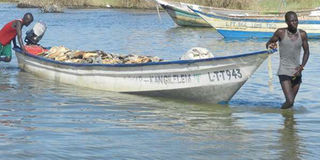New law is a big boost to fisheries sector

Fishermen carry fish from Lake Turkana to the shore on August 31, 2016. Kenya Marine and Fisheries Research Institute and other agencies already have a platform in RV Mtafiti to provide information and carry out mapping of marine resources in the Exclusive Economic Zone (EEZ). PHOTO | NATION MEDIA GROUP
What you need to know:
- The enactment of the law comes in handy because for decades, communities around fishing areas have remained poor because of lack of a conducive legal framework to guide the sector.
- Under the Act, The Tuna Management Strategy is expected to transform fisheries from artisanal to commercial industry by engaging in Private Public Partnerships (PPP).
The assenting to the Fisheries Management and Development Act 2015 by President Uhuru Kenyatta marks the country’s long journey to tap into the massive marine resources that have been under-utilised for years.
More promising was the immediate formation of a team led by the Chief of Defence Forces, Gen Samson Mwathethe, to prepare a roadmap on tapping the blue economy and submit a report on the way forward to him in two months.
The enactment of the law comes in handy because for decades, communities around fishing areas have remained poor because of lack of a conducive legal framework to guide the sector.
The fisheries sector has been faced with several challenges including a weak policy framework, limited access to markets, low productivity (yields) and outputs (quantities), weak institutional capacity, weak monitoring and evaluation and lack of use of informational technology, which have limited the sector’s contribution to food security and wealth creation.
This has seen regions with vast natural fish production such as Western and Nyanza, Turkana and Coast regions recorded as some of the least developed areas.
Under the Act, The Tuna Management Strategy is expected to transform fisheries from artisanal to commercial industry by engaging in Private Public Partnerships (PPP).
The Act provides that existing infrastructure, including the ports in Mombasa and Lamu and the proposed fishing ports of Shimoni, Kilifi, Malindi and Kiunga, be upgraded and made efficient.
Devolved units along the coast lines are expected to invest more resources mainly through the construction of jetties at strategic locations to encourage commerce and tourism.
The country strategy is to focus on coastal tourism, offshore oil and gas exploration, deep and short-sea shipping, yachting and marinas, passenger ferry services and cruise tourism as a starting point.
The focus will gradually shift to fisheries and aquaculture, inland water way transport, coastal protection, offshore wind, blue biotechnology, desalination, aggregates and marine mineral mining, marine aquatic products and ocean renewable energy.
The Fisheries Management and Development Act 2016 will establish a Fisheries Service Advisory Council to negotiate partnership and fishing access agreements, fisheries monitoring and patrol mechanisms and improve aquaculture to commercial levels.
Further, Kenya Fish Marketing Authority will be established to spearhead the implementation and co-ordination of a fish marketing strategy.
GOOD DECISION
The choice of the Chief of Defence Forces to chair the taskforce is telling; security agencies, and specifically the Kenya Navy, will be vital in the exploitation of the marine resources through enhancing existing patrols, compliance and surveillance in collaboration with enforcement and regulatory bodies in the offshore waters.
This will stop the plunder of our marine resources which is currently going on.
The Marine Police Unit, Tourism police Unit, Kenya Wildlife Service and Kenya Forest Service can secure the near-shore areas, including county ports and fish landing sites.
The Offshore Patrol Vessel (OPV), to be delivered early next year, and Vessel Monitoring System (VMS) under the State Department of Fisheries will be a big boost to this initiative.
The ultimate long term solution will be the creation of a Coast Guard.
Kenya Marine and Fisheries Research Institute and other agencies already have a platform in RV Mtafiti to provide information and carry out mapping of marine resources in the Exclusive Economic Zone (EEZ).
Munene Mukaraku, is the corporate communication officer at Kenya Marine and Fisheries Research Institute while Victor Bwire works at the Media Council of Kenya and teaches environmental journalism.
The views expressed here do not represent the official position of the organisations.




